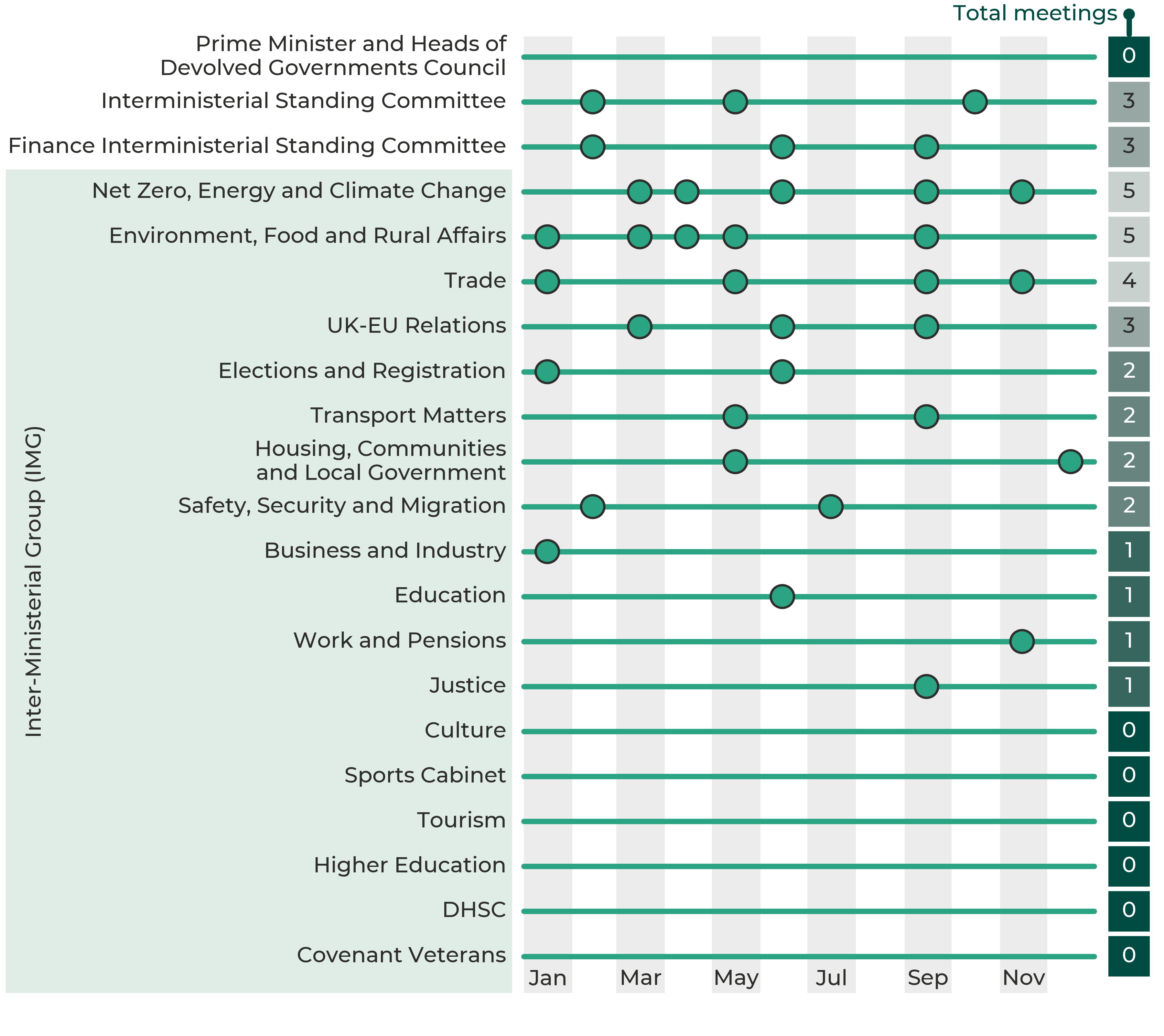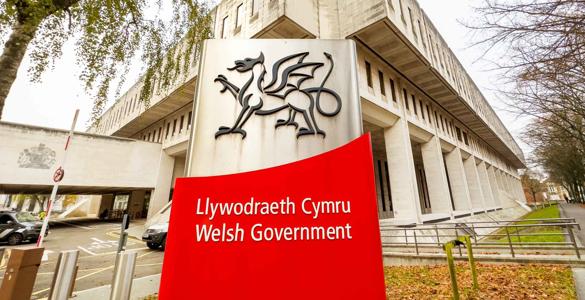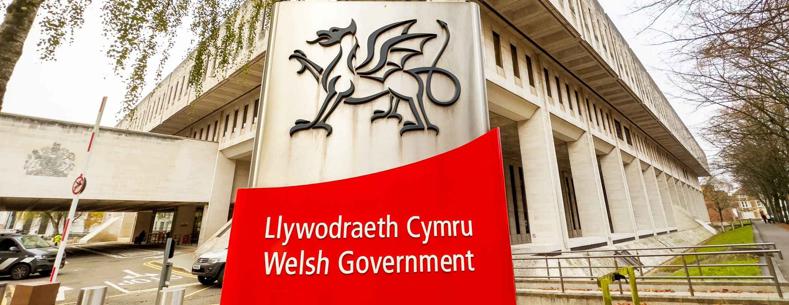Two years after a review of intergovernmental relations between UK and devolved governments (‘the review’), the Welsh Government has described relations as “mixed”.
The UK’s departure from the EU and the increase in the number of UK bills making provision in devolved areas mean intergovernmental activity now has “even greater importance”. In our article last year, we considered progress made one year after the review, so has twelve more months made any difference?
This article will consider the frequency and quality of meetings under the new structures and how transparent they are. It explores the Welsh Government’s assessment of intergovernmental relations (IGR) and the new dispute resolution process.
The three-tier structure announced in 2022 consists of:
- Policy-focused Interministerial Groups (IMGs);
- An Interministerial Standing Committee (IMSC) to provide oversight of the IMGs and to discuss cross-cutting issues, and a Finance Interministerial Standing Committee (F:ISC) to discuss cross-cutting financial matters; and
- A Prime Minister and Heads of Devolved Governments Council.
The review established a new dispute resolution and avoidance mechanism, in light of criticisms of the previous process.
For more analysis of these structures and the new process for resolving disputes, see our earlier article.
How often were the new structures used in 2023?
The following graphic shows when and how often meetings occurred within the new structures in 2023.
Figure 1: Meetings within the new IGR structures in 2023

Sources: UK Government, Intergovernmental Relations; Welsh Government, Announcements; and Senedd Cymru, Inter-Institutional Relations Agreement. Accessed 25 January 2024.
Compared to 2022, there was an overall increase in reported meetings in 2023, from 23 to 35.
Both the ‘Net Zero, Energy and Climate Change’, and ‘Environment, Food and Rural Affairs’ IMGs met five times in 2023. Four IMGs which did not meet in 2022 met in 2023: Justice; Safety, Security and Migration; Work and Pensions (while most IMGs consist of representatives from all UK governments, this Group is bilateral between the Welsh Government and Department for Work and Pensions); and Transport Matters.
The Prime Minister and Heads of Devolved Governments Council has yet to meet since its inaugural meeting in November 2022. Several IMGs proposed in the review have yet to be established, including an IMG for health and social care. In its report on IGR between 2021-2023, the Welsh Government noted that two health and social care IMG meetings were arranged, but were cancelled due to the availability of UK Government Ministers.
There is also little information on whether an IMG on science will be established, or whether engagement will continue outside of the structures.
The Welsh Government agreed to provide the Senedd with one month’s notice of intergovernmental meetings (as far as practicable) and written summaries of issues discussed. The Legislation, Justice and Constitution Committee noted in its Annual Report for 2022-23 it had received sufficient prior notice for 23 out of 30 meetings.
There are also inconsistencies with the detail of written summaries provided to the Senedd to assist it in its scrutiny of IGR. Some IMG discussion points are very brief, whilst others are more detailed. Communiqués from the UK Government also vary in quality and can sometimes take months to be published.
How does the Welsh Government view relations?
As part of its agreement with the Senedd, the Welsh Government reports on IGR on a regular basis. In its recent report, it said the summer and early autumn of 2022 was “a particular low point in engagement from the UK Government”.
The First Minister has suggested that the appointment of a new Prime Minister in October 2022 did not lead to a significant improvement. Speaking in September 2023, he said that “tonally relations are better” but that substantively, he was “not sure that things are very different”.
The Welsh Government has noted positive experiences of IGR. It referred to work on the Freeport Programme as “a benchmark for how Welsh Government can act in a partnership of equals with UK governments”.
However, Welsh Government Ministers have also expressed frustration at the lack of attendance by relevant Secretaries of State at IMG meetings.
The First Minister suggested the review has not yet led to a “reliable, regular rhythm” in relations. He further stated that the UK Government does not “have much energy for or interest in” IGR.
The Secretary of State for Wales, David T.C. Davies MP, said that “it takes two to dance”, but that he has “perfectly good professional working relationship” with Welsh Ministers on matters of shared interest.
Triggering the dispute resolution process
There is a lack of clarity as to whether the new dispute resolution process has been used.
The Counsel General, Mick Antoniw MS, stated in December 2023 that it has not yet been triggered. However, in January 2024, Parliamentary Under-Secretary of State for Levelling Up, Housing and Communities, Baroness Penn, said the process has been engaged once, in a dispute between the Northern Ireland Executive and UK Government on pension payments to persons with Troubles-related injuries.
The First Minister suggested the review “was about dispute avoidance”, and the new machinery “should be able to deal” with differences in views between the governments. Whilst expressing a desire to avoid disputes, the Welsh Government’s report on IGR stated it stands “ready to escalate where appropriate”.
The First Minister noted the importance of being on “the very best ground” before triggering the process, adding that he has not yet been persuaded that the best case has been identified. In July 2023, the Counsel General said that the process is unlikely to be appropriate for challenging individual pieces of legislation due to the likely timescales involved. He instead suggested it could be used to raise more general issues, such as frequent disregarding of the Sewel Convention.
There have also been delays to the establishment of the IGR Secretariat, which will handle disputes. In September 2023, the First Minister welcomed the appointment of the head of the Secretariat, noting that further appointments were expected shortly. In January 2024, Baroness Penn outlined that, while the UK and Scottish governments have assigned members of staff to the Secretariat, the Welsh Government is yet to do so. She also said decisions on the Northern Ireland Executive’s appointments would be made after it is restored.
2024: Changes ahead?
Overall, in 2023 there was an increase in the number of meetings taking place within the new structures, but a lack of clarity as to the extent to which elements such as the dispute resolution process and independent secretariat are bedding in.
With a new First Minister due in post by Easter, and a general election set to be called sometime in the next 12 months, the intergovernmental structures may continue to be tested through a time of potential political change.
Article by Adam Cooke, Senedd Research, Welsh Parliament






